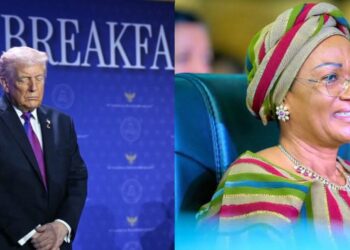
By Ibrahim Kegbegbe
As a political analyst with a deepening interest in the interplay between perception, strategy, and reality, I often reflect on the curious ways some self-proclaimed political stalwarts interpret unfolding events. These individuals, who claim to understand the intricacies of power and succession, frequently leap to conclusions based more on political sentiment than philosophical reasoning or logical deduction.
One recent example lies in the assumptions surrounding Seyi Tinubu—the son of Nigeria’s President, Asiwaju Bola Ahmed Tinubu—and his perceived governorship ambition in Lagos State. Following the just-concluded Ramadan fasting season of 2025, a flurry of narratives emerged, framing Seyi’s generous sponsorship of Iftar programmes across Northern Nigeria and later in Lagos as a strategic bid for the 2027 Lagos governorship seat.
According to these analysts, the Iftar engagements were no mere acts of piety or public engagement—they were calculated moves to secure political goodwill ahead of the next general elections. Their reasoning, however, misses a critical philosophical layer of Nigerian political gamesmanship. For those who understand the deeper calculus of power, this was not about Seyi Tinubu’s immediate political ascension—it was about consolidating long-term influence and laying groundwork for future political negotiations.
The narrative grew stronger with the political drama in the Lagos State House of Assembly, where Speaker Mudashiru Obasa faced impeachment, only to be reinstated shortly afterward. Some analysts linked this power tussle directly to the so-called “Seyi 2027 Project,” arguing that the speaker’s removal was engineered to neutralize an emerging rival to Seyi’s supposed ambition. But when Obasa was swiftly reinstated, a question naturally followed: did that not upend their entire theory?
Still, the myth of Seyi Tinubu’s imminent gubernatorial candidacy persists. These analysts cite posters of Seyi seen across the state as evidence of his declared ambition. They interpret every symbolic gesture—be it his appearance at community events, philanthropic gestures, or association with grassroots actors—as definitive signs of a 2027 takeover.
But such an interpretation is, to put it mildly, shallow.
Seyi Tinubu is indeed a rising figure in Nigerian politics. With a background in business and youth advocacy, and as a visible symbol of political continuity within the Tinubu dynasty, his emergence is inevitable. Yet, the timing and trajectory of his political journey must be understood with nuance. Nigerian politics, especially in Lagos, is not just about ambition—it is about timing, power consolidation, and regional balancing.
The Iftar programmes were not seeds of Seyi’s gubernatorial campaign—they were offerings to the political gods of Nigeria’s North. They were carefully crafted gestures aimed at softening the runway for President Bola Tinubu’s broader political agenda leading up to the 2027 elections, where alliances will be crucial. Appeasing Northern stakeholders was a necessity, not for Seyi, but for Asiwaju’s enduring legacy and national political survival.
Let us not be mistaken—Seyi Tinubu may become governor of Lagos State someday. But that day is not in 2027. It is in 2031.
If current political alignments hold, the APC’s governorship candidate in 2027 may very well be a placeholder—a bridge figure designed to serve a single term while paving the way for Seyi’s grand entrance in 2031. Names such as former Governor Akinwunmi Ambode have been whispered in political corridors as possible contenders. If not him, another trusted loyalist could be chosen to temporarily steward the state, ensuring no disruption in the longer-term plan.
In Nigerian politics, timing is everything. Power is rarely seized—it is carefully transferred, bargained, or inherited through a dance of loyalty, compromise, and consensus. To see Seyi Tinubu as a 2027 project is to ignore this dance. His rise will not be abrupt—it will be methodical, ceremonial, and well-orchestrated.
As political watchers, we must be careful not to mistake noise for strategy, or optics for intent. Philosophical and logical thinking requires that we interrogate deeper meanings behind public gestures, and resist the temptation to proclaim every movement as a march to power.
The Lagos of 2027 will be a staging ground for the Lagos of 2031. And if the Tinubu political dynasty holds steady, then Seyi Tinubu is not just a possibility—he is a certainty. But only in due season.
Ibrahim Taofeek Kegbegbe
The Head of Media and Publicity Secretary Bullion Records.
The Editor-in-chief of The Merit Newspaper.
08024248696
ibrahimtaofeekkegbegbe@gmail.com

















